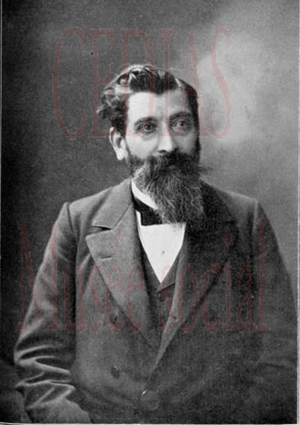Paul Brousse facts for kids
Quick facts for kids
Paul Brousse
|
|
|---|---|

Paul Brousse ca. 1900
|
|
| Born |
Paul Louis Marie Brousse
23 January 1844 |
| Died | 1 April 1912 (aged 68) |
| Resting place | Père Lachaise Cemetery |
| Nationality | French |
Paul Louis Marie Brousse (born January 23, 1844 – died April 1, 1912) was a French politician and a leader of a group called the "Possibilists." He was important in the early socialist movement in France. He worked with different political groups and helped publish newspapers.
Contents
Early Life and Political Beginnings
Paul Brousse studied medicine when he was young. He traveled to Barcelona, Spain. Later, he joined a big international group called the International Working Men's Association (IWMA). This group aimed to unite workers from different countries.
In September 1873, he attended a meeting in Geneva. At this time, he believed that anarchism was the best way to organize society. Anarchism is a political idea that suggests society should be organized without a government.
Activism and Publications
Paul Brousse was very active in the Jura Federation. This was a part of the IWMA located in Switzerland and the Alsace region. He helped edit a newspaper called the Bulletin de la Fédération Jurassienne. He worked on this paper with Peter Kropotkin, who was also an anarchist.
Brousse also edited two other newspapers. One was in French and the other in German. He helped another person, James Guillaume, publish his newspaper too. In 1877, he wrote a famous revolutionary song called Le drapeau rouge (which means The Red Flag).
Political Changes and Later Life
In 1880, Paul Brousse returned to France. Over time, his political ideas started to change. He became more interested in making changes through reforms, rather than through revolution.
He joined the French Workers' Party (POF). Later, this party split, and he became a leader of the Federation of the Socialist Workers of France (FTSF). This group became known as the "Possibilists." The Possibilists believed in achieving socialist goals step-by-step, through practical reforms.
In 1896, Paul Brousse attended an international meeting in London. He voted with Jules Guesde to remove some "anti-authoritarian socialists" (who were anarchists) from the group.
Later, in 1902, the Possibilists joined Jean Jaurès's French Socialist Party. In 1905, this party combined with other groups to form a larger party called the French Section of the Workers' International (SFIO). Paul Brousse was an important figure in these political changes in France.
See also
 In Spanish: Paul Brousse para niños
In Spanish: Paul Brousse para niños
 | Laphonza Butler |
 | Daisy Bates |
 | Elizabeth Piper Ensley |

